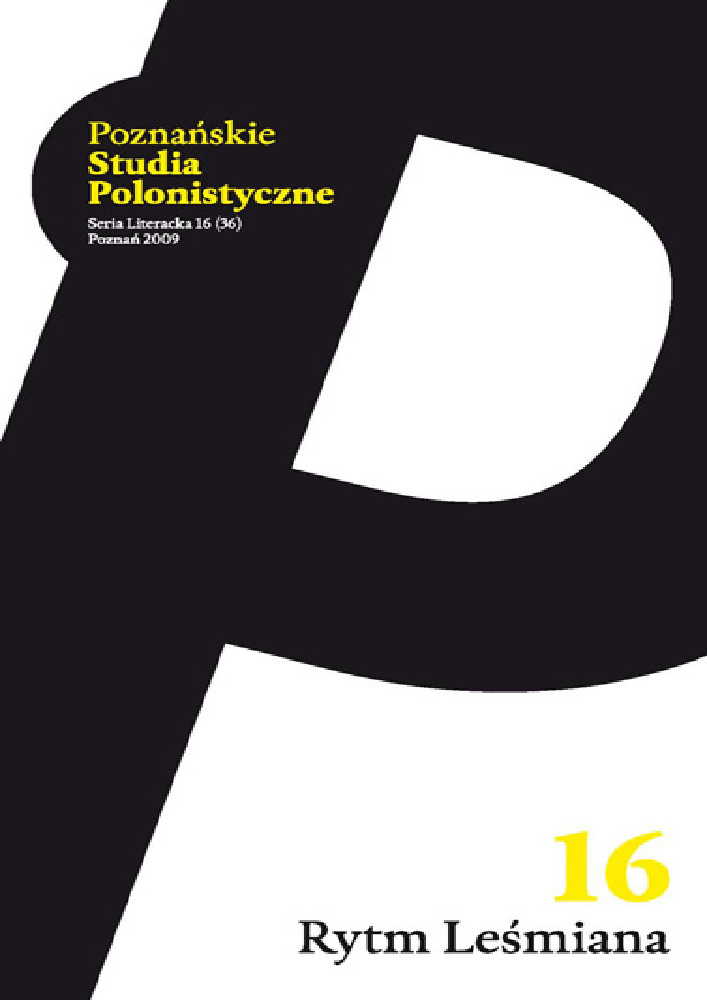Abstract
Leśmian’s poems, those that can be treated as parables with the thirdperson narrator and a given plot and those written with the lyrical I and straightforward narrative, include a dominant and premeditated anthropological conception. Leśmian is intrigued by the relation between an individual and other people. The relation is conducive, or even essential, in the spiritual survival of the individual, and is often described as a “salvation”. The relevant issues can be interpreted within the language of the philosophy of dialogue, including the philosophy of Emmanuel Lévinas, though the latter cannot be obviously treated in terms of decisive influence. The space where the ethical dimension of the interpersonal relations is revealed is namely love towards the closest pesons, it is followed by the encounter with other people, and finally the encounter with radical otherness, with what is, beyond the very experience of humanity, different — with a suffering animal. In Leśmian’s poetical output, in which the ontological and epistemological dimensions are so important, it is rather the ethical dimension that becomes prominent. This dimension, often neglected by researches of the poet’s rich and versified output, quite unexpectedly seems to come down to some absolutely fundamental ethical imperatives: to love and keep in mind that one should not hurt or kill with words or deeds.
References
Baudelaire Ch., Romantyczny zachód słońca, przeł. R. Kołoniecki, w: idem, Kwiaty zła, wybór M. Leśniewska, J. Brzozowski, posłowie J. Brzozowski, Kraków 1994, s. 377.
Fazan K., „Zdziczenie obyczajów pośmiertnych”: miłość, śmierć, profanacja oraz głębsze znaczenie, w: eadem, Projekty intymnego teatru śmierci. Wyspiański, Leśmian, Kantor, Kraków 2009.
Głowiński M., Elegie autobiograficzne Leśmiana, w: idem, Prace wybrane, t. 4: Zaświat przedstawiony. Szkice o poezji Bolesława Leśmiana, Kraków 1998.
Głowiński M., Leśmian, Poe, Baudelaire, w: idem, Prace wybrane, t. 4: Zaświat przedstawiony. Szkice o poezji Bolesława Leśmiana, Kraków 1998, s. 305-320.
Głowiński M., „Spotykam go codziennie...” Bolesława Leśmiana — trzy kategoryzacje świata, w: idem, Prace wybrane, t. 4: Zaświat przedstawiony. Szkice o poezji Bolesława Leśmiana, Kraków 1998.
Głowiński M., Świat ptasi w poezji Bolesława Leśmiana, w: idem, Monolog wewnętrzny Telimeny i inne szkice, Kraków 2007, s. 236-237.
Głowiński M., [Zwoływali się surmą...]. Notatka poetycka, w: Wiersze Bolesława Leśmiana, wyd. 2, Warszawa 1987.
Gutowski W., Poezja Bolesława Leśmiana a mity erotyczne Młodej Polski, w: idem, Nagie dusze i maski. O młodopolskich mitach miłości, Kraków 1992.
Kamieńska A., Metafizyczny wół, „Życie Literackie” 1974, nr 5.
Igliński G., Liryczna transformacja bajkowego bohatera — „Il bove” G. Carducciego a wiersz Z. Przesmyckiego, L. Staffa i B. Leśmiana, w: W stronę dwudziestolecia 1918-1939. Studia i szkice o literaturze, red. Z. Andres, Rzeszów 1993.
Lange A., Jeszcze o St. Pieńkowskim i o gramatyce polskiej, „Gazeta Polska” 1919, nr 350.
Lange A., O p. St. Pieńkowskim i o bułanym koniu, „Gazeta Polska” 1919, nr 305.
Leśmian B., Poezje, oprac. A. Madyda, wstęp M. Jakitowicz, Toruń 1995.
Lévinas E., Całość i nieskończoność. Esej o zewnętrzności, przeł. M. Kowalska, wstęp B. Skarga, przekład przejrzał J. Migasiński, Warszawa 1998.
Lévinas E., Inaczej niż być lub ponad istotą, przeł. P. Mrówczyński, Warszawa 2000.
Markowski M.P., Leśmian. Poezja i nicość, w: idem, Polska literatura nowoczesna. Leśmian, Schulz, Witkacy, Kraków 2007, s. 133.
Michałowski P., Bolesław Leśmian: ktoś „oprócz głosu”, w: idem Głosy, formy, światy. Warianty poezji nowoczesnej, Kraków 2008, s. 15-40.
Nawrocki M., Wariacje istnieniowe. O ontologii poetyckiej Bolesława Leśmiana, Tarnów 2009.
Nietzsche F., Niewczesne rozważania, przeł. L. Staff, Kraków 2003.
Niewiadomski D., Urodzony ku wolności. Wiersze legionowe Adama Szczerbowskiego (1894-
-1956), w: W stronę dwudziestolecia 1918-1939. Studia i szkice o literaturze, red. Z. Andres, Rzeszów 1993.
Nycz R., Literatura jako trop rzeczywistości. Poetyka epifanii w nowoczesnej literaturze polskiej, Kraków 2001.
Nycz R., Wielowykładalność: symboliczne alegorie Leśmiana, w: idem, Tekstowy świat. Poststrukturalizm a wiedza o literaturze, wyd. 2, Kraków 2000, s. 131-137.
Ricoeur P., O interpretacji. Esej o Freudzie, przeł. M. Falski, oprac. R. Reszke, Kraków 2008.
Rowiński C., Człowiek i świat w poezji Leśmiana. Studium filozoficznych koncepcji poety, Warszawa 1982.
Rymkiewicz J.M., Trzy róże, w: idem, Leśmian. Encyklopedia, Warszawa 2001, s. 360-363.
Saint-Cheron M. de, Rozmowy z Emmanuelem Lévinasem, przeł. K. Kot, Warszawa 2008.
Szczerbowski A., Kwiat na mogile, Warszawa 1928.
Skrendo A., Bolesław Leśmian: „Najtrwalszy ze wszystkich przywidzeń i dziwot”, w: idem, Poezja modernizmu. Interpretacje, Kraków 2005, s. 99-103.
Staff L., Poezje zebrane, t. 1, Warszawa 1980.
Stala M., Jam jest miejsce spotkania. Duch, dusza i ciało w poetyckiej antropologii Bolesława Leśmiana, w: Trzy nieskończoności. O poezji Adama Mickiewicza, Bolesława Leśmiana i Czesława Miłosza, Kraków 2001.
License
Authors
Authors of texts accepted for publication in „Poznańskie Studia Polonistyczne. Seria Literacka” are required to complete, sign and return to the editor's office the Agreement for granting a royalty-free license to works with a commitment to grant a CC sub-license.
Under the agreement, the authors of texts published in „Poznańskie Studia Polonistyczne. Seria Literacka” grant the Adam Mickiewicz University in Poznań a non-exclusive, royalty-free license and authorize the use of Attribution-NoDerivatives 4.0 International (CC BY-ND 4.0)Creative Commons sub-license.
The authors retain the right to continue the free disposal of the work.
Users
Interested Internet users are entitled to use works published in „Poznańskie Studia Polonistyczne. Seria Literacka” since 2016, for non-commercial purposes only, under the following conditions:
- attribution - obligation to provide, together with the distributed work, information about the authorship, title, source (link to the original work, DOI) and the license itself.
- no derivatives - the work must be preserved in its original form, without the author's consent it is not possible to distribute the modified work, such as translations, publications, etc.
Copyrights are reserved for all texts published before 2016.
Miscellaneous
Adam Mickiewicz University in Poznań retains the right to magazines as a whole (layout, graphic form, title, cover design, logo etc.).
